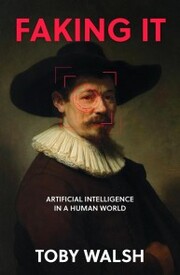Detailansicht
Faking It
eBook - Artificial Intelligence in a Human World
ISBN/EAN: 9781803994604
Umbreit-Nr.: 1612127
Sprache:
Englisch
Umfang: 248 S., 2.26 MB
Format in cm:
Einband:
Keine Angabe
Erschienen am 02.11.2023
Auflage: 1/2023
E-Book
Format: EPUB
DRM: Digitales Wasserzeichen
- Zusatztext
- 'Refreshingly clear-eyed Faking It is an insightful and intelligent book that's a must for those looking for facts about AI hype.' Books+Publishing'AI will be as big a game-changer as the smart phone and the personal computer or bigger! This book will help you navigate the revolution.' Dr Karl KruszelnickiArtificial intelligence is, as the name suggests, artificial and fundamentally different to human intelligence. Yet often the goal of AI is to fake human intelligence. This deceit has been there from the very beginning. We've been trying to fake it since Alan Turing answered the question 'Can machines think?' by proposing that machines pretend to be humans.Now we are starting to build AI that truly deceives us. Powerful AIs such as ChatGPT can convince us they are intelligent and blur the distinction between what is real and what is simulated. In reality, they lack true understanding, sentience and common sense. But this doesn't mean they can't change the world.Can AI systems ever be creative? Can they be moral? What can we do to ensure they are not harmful? In this fun and fascinating book, Professor Toby Walsh explores all the ways AI fakes it, and what this means for humanity now and in the future.
- Kurztext
- Bringing together scholars and researchers in one volume, this study investigates how the thinking of the Ukrainian-Israeli somatic educationalist Moshe Feldenkrais (1904-84) can benefit and reflect upon the creative practices of dance, music and theatre. Since its inception, the Feldenkrais Method has been associated with artistic practice, growing contiguously with performance, cognitive and embodied practices in dance, music, and theatre studies. It promotes awareness of fine motor action for improved levels of action and skill, as well as healing for those who are injured. For creative artists, the Feldenkrais Method enables them to refine and improve their work. This book offers historical, scientific and practical perspectives that develop thinking at the heart of the Method and is divided into three sections: Historical Perspectives on Creative Practice, From Science into Creative Practice and Studies in Creative Practice. All the essays provide insights into self-improvement, training, avoiding injury, history and philosophy of artistic practice, links between scientific and artistic thinking and practical thinking, as well as offering some exercises for students and artistic practitioners looking to improve their understanding of their practice. Ultimately, this book offers a rich development of the legacy and the ongoing relevance of the Feldenkrais Method. We are shown how it is not just a way of thinking about somatic health, embodiment and awareness, but a vital enactivist epistemology for contemporary artistic thought and practice.
